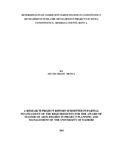| dc.description.abstract | In the academic discourse decentralization has long come to be regarded as the best way of integrating local people into the web of development. Development practitioners, however, see decentralization as a necessary but not a sufficient condition for involving cross-section of community members into development intervention. Because of elite domination a powerful few customarily overshadow the powerless mass, the poor and the marginalized and successfully block their meaningful integration and participation in CDF development projects activities. This present study is an endeavor to have a fresh look at the local governance status through assessing the level of community members' participation in CDF development process. The study also explores the actors and factors shaping participation as well as causes for non-participation. For the purpose of the study Mvita Constituency was selected. Both the community members and the Project Implementation Committee members have been interviewed through a structured questionnaire. The study reveals some interesting findings indicating that socio-economic backgrounds of the participants are found to be vital factors influencing their participation. Participation is mostly limited to the socially, economically and politically well off people. Political influence in the CDF project activities and also in the Project Implementation Committee is a common practice which ultimately hinders the effectiVe participation of the community members. Moreover, the existing rules and regulations in the county government as well 8 the structure of the CDF influence participation as well. In synthesis, it is mentionable that all the variables and indicators taken in this study to explain the dependent variable (participation of community people in CDF development projects) have been found to be significantly correlated. In fact, the elected representatives seem to have developed a patron-client relationship with the community elites in sharing mutual benefits which keeps the poor and the marginalized outside the CDF project process. In order to break through the unholy alliance and to place a culture of participatory practice at the constituency level, massive awareness programs in community participation need to be initiated. Project evaluation system should also be activated to bring transparency in the CDF project management system and to ensure accountability in the activities of the selected representatives. | en_US |

